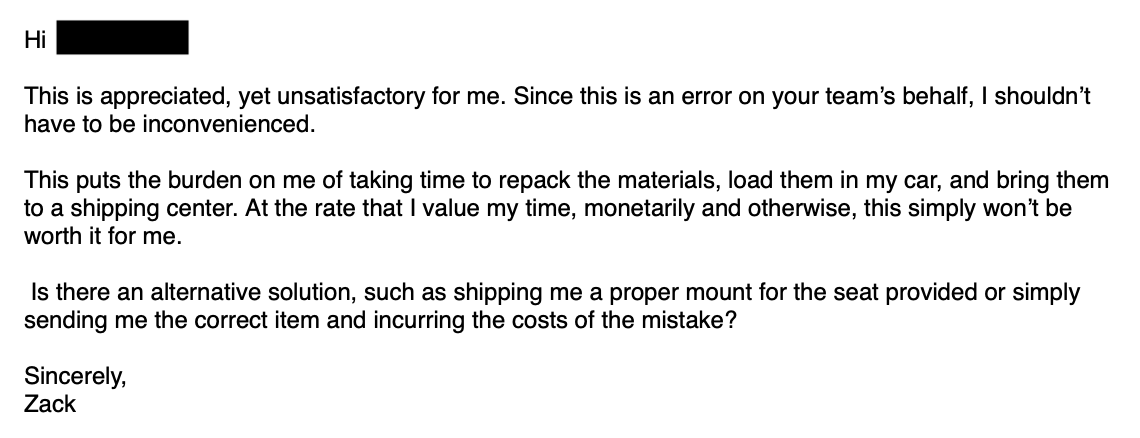Here's How I Value My Time
And why returning a $128 package wasn't worth it
I used to value money more than my time.
I don’t think I ever would’ve said that, but it showed up in my actions.
Maybe I’d go out of my way to save some money. Maybe I’d do things myself instead of paying someone. Maybe I’d put my time into projects I didn’t love for some financial return. Things like that.
Now, I’m the opposite: I tend to choose more time over more money.
The reason is simple: money is limitless; time is not.
Now, you might be thinking, “What do you mean money is limitless? My bank account doesn’t look like it.”
Fair point. But hear me out—money is a renewable resource. There is an abundance of it in the world and you have access to its flow. You can earn more, invest it, create it, borrow it, lose it, and get it back again.
Time? Not so much. Twenty-four hours in a day, seven days in a week, and once they’re gone, they’re gone. No amount of money can buy them back afterward.
At some point in my path, this hit home, and I started to prioritize my time more than income.
What I mean is, I want to use my time how I want.
I don’t want to use my time how I don’t want in order to make money.
Because, what’s the point of more money? After the basic necessities of food and shelter, isn’t the point of more money to have a better quality of life? So why are so many people sacrificing their quality of life to make more of it? It makes no sense.
Time is an illusion—all that exists is the ever-unfolding present moment—but it’s an illusion we all live by. So it certainly is a significant factor in this human experience. We have a certain number of days, weeks, months, and years in this human form and I intend to use them in ways that I want.
So when I say I prioritize time, what I mean is that I prioritize time to do things that are fulfilling, enjoyable, and aligned with my purpose—things that contribute to my well-being and the well-being of others.
Everything is Negotiable
Here’s a radical belief of mine: everything is negotiable.
We’re conditioned to accept things as they are. Rules, policies, agreements—so much of what we’re told about life gets accepted as fact and we forget there are other options.
Negotiation is usually framed around getting something we want—more money, better terms, a discount. I negotiate for my time.
If something doesn’t align with how I want to spend my finite hours, I explore my options. Sometimes, that means outsourcing; other times, it’s finding a creative workaround. Sometimes, of course, it’s saying no.
Either way, my guiding principle is the same: if it’s not worth my time, I don’t do it.
Again, that worth is not just about financial worth; it’s about fulfillment, alignment, purpose, and enjoyment.
That’s enough to make a decision.
These days, if something doesn’t interest or excite me, I’m not likely to do it.
That said, a financial value can provide a useful model to support with navigating choices around time.
The Value of an Hour
A lot of people are used to trading time for money. Even if you don’t get paid hourly, most people who are “working” in whatever capacity (salaried, project-based, etc.) are still putting in hours toward some deliverable(s) and receiving financial return, which means that an hourly rate can be determined or, at least, estimated. So that’s a model that can be helpful here.
This isn’t only about how much income you generate per hour, though you could use that as a starting point. For me, it’s also a blend of opportunity cost (what would be the financial value of that time if I spent it elsewhere) and, quite simply, how much I value my free time.
So let’s say that I value my time at $500 an hour.
This doesn’t mean everything I do needs to generate money (what a dull life that would be). It also doesn’t mean I think about all my time this way. It’s simply a benchmark for making decisions around my time.
For example, if something I don’t find purposeful, fulfilling, or enjoyable costs me less than my hourly value to outsource, I tend to do so. I take care of my place, but I don’t enjoy deep cleaning. It would take me about two hours to give my pad a good scrub down, and it’s much cheaper than $500 an hour to hire someone, so I delegate it to a professional (who does a far better job than me, by the way). This is, in essence, buying my time back, assuming I want to live in a clean dwelling.
That’s pretty straightforward, but there are more nuanced applications for this as well, ranging from pricing professional services and arranging travel plans to mundane tasks, such as grocery shopping or returning items… such as a faulty chair.
Let me tell you about this chair, as it illuminates the two primary topics of this post: how I value time and view everything as negotiable.
The Faulty Desk Chair
I recently ordered a desk chair. It was $128. When it arrived, one of the parts was incorrect so it couldn’t be properly assembled. I contacted the company, and they sent me a standard response: “Return the item, and we’ll send you a replacement.”
Here’s the actual email:
I ran a quick estimate to determine if this was worth it. I figured it would take me about an hour to repack the parts, tape it up, print a shipping label (I don’t own a printer), slap a shipping label on it, and bring it to a shipping center near me. Further, that’s not a good use of my time. It’s an hour I’d much rather spend writing, coaching, making art, visiting a loved one (whose time is also finite), meditating, hiking, reading, cooking, or simply enjoying life.
So I did some quick math. Returning the item would be $500 worth of my time. The chair cost $128. Not worth it for me. I’d rather just take 3 minutes and buy another for $128. But before I did that, I took a moment to consider alternative solutions because everything is negotiable.
So I sent a message explaining that their proposed solution was not going to work for me, prompting them to provide an alternative solution, and offering a couple options that would be acceptable. Here’s my email back:
I promptly received an email back agreeing to my request.
I find the use of “safely” to be hilarious here, as if I was going to ignite it and throw it from a rooftop, but the concern for my well-being (or their legal protection) is kindly noted:
This is a very simple, small example of these principles at play.
What did this give me? An hour of my time (55 minutes, accounting for the emails). That’s an hour I got to spend writing this, which I consider to be a far better use of my time than packing and returning an item.
As for the faulty chair? My father now has a fun project making a new mount for it, which brings him joy and purpose (he was a brilliant toolmaker for his entire career). I’ll either keep it as a backup or gift it to someone.
Oh, and the company will get a glowing review from me for handling this so well.
Everybody wins.
The Big Picture
This story isn’t really about returning a chair, of course. It’s about rethinking how we value time, making decisions accordingly, and negotiating as needed.
You don’t have to adopt a $500/hour benchmark. Your number might be higher or lower. You don’t even have to have a number at all… The point is to be intentional with how you use this finite resource on which our physical lives are predicated.
When you start valuing your time, you start noticing all the places where you’ve been using it unfavorably. You see what’s negotiable, what’s outsourceable, and what’s simply not worth doing.
So the invitation here is to consider what your time is worth to you and how you want to use it.
How do you value your time, monetarily and otherwise? And what would it look like to uphold and respect that value in your daily life?






Such a great example!! I have been thinking about this a lot lately… time is a gold illusion!